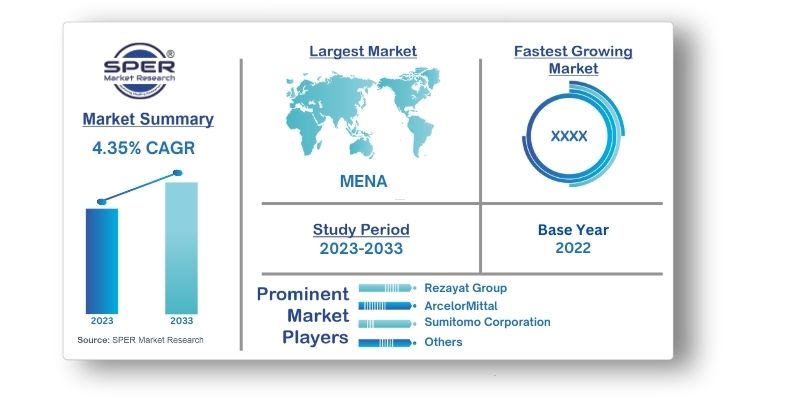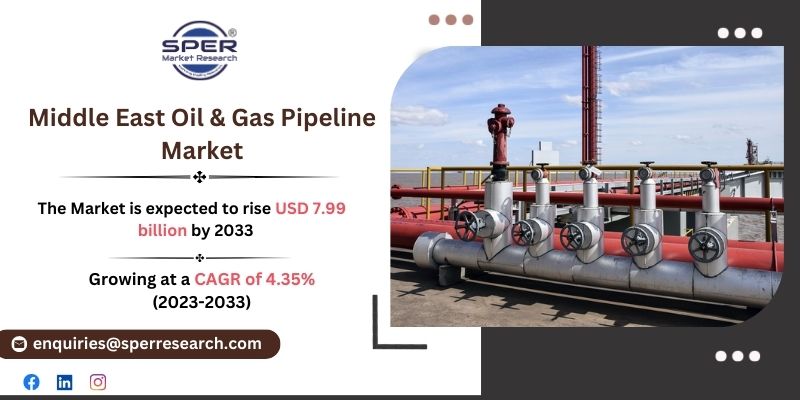
Middle East Oil & Gas Pipeline Market Growth, Trends, Size, Share, Revenue and Future Outlook
Middle East Oil and Gas Pipeline Market Size- By Type, By Application, By Source- Regional Outlook, Competitive Strategies and Segment Forecast to 2033
| Published: Jun-2023 | Report ID: POAE2337 | Pages: 1 - 158 | Formats*: |
| Category : Power & Energy | |||


| Report Metric | Details |
| Market size available for years | 2019-2033 |
| Base year considered | 2022 |
| Forecast period | 2023-2033 |
| Segments covered | By Type, By Application, By Source |
| Regions covered | Bahrain, Iran, Iraq, Israel, Jordan, Kuwait, Lebanon, Oman, Qatar, Saudi Arabia, Syria, Turkey, United Arab Emirates, Rest of the Middle East |
| Companies Covered | Abu Dhabi Metal Pipes & Profiles Industries Complex LLC, EEW Group, Arabian Pipes Company, Vallourec SA, Jindal SAW Ltd, Rezayat Group, Sumitomo Corporation, ArcelorMittal, Others |
- Energy and Infrastructure Investors
- Engineering, Procurement, and Construction (EPC) Companies
- Equipment and Technology Providers
- Government and Regulatory Bodies
- International Organizations and Associations
- Oil and Gas Companies
- Pipeline Operators and Owners
- Research and Academic Institutions
- Research Organizations and Consultants
- Middle East Oil & Gas Pipeline Market Value Share and Forecast, By Type, 2023-2033
- Crude Oil Pipeline
- Natural Gas Pipeline
- Middle East Oil & Gas Pipeline Market Value Share and Forecast, By Application, 2023-2033
- Offshore
- Onshore
- Middle East Oil & Gas Pipeline Market Value Share and Forecast, By Source, 2023-2033
- Downstream
- Midstream
- Upstream
- Bahrain
- Iran
- Iraq
- Israel
- Jordan
- Kuwait
- Lebanon
- Oman
- Qatar
- Saudi Arabia
- Syria
- Turkey
- United Arab Emirates
- Rest of Middle East
- Middle East Oil & Gas Pipeline Market Size (FY’2023-FY’2033)
- Outline of Middle East Oil & Gas Pipeline Market
- Segmentation of Middle East Oil & Gas Pipeline Market By Type (Crude Oil Pipeline, Natural Gas Pipeline)
- Segmentation of Middle East Oil & Gas Pipeline Market By Application (Offshore, Onshore)
- Segmentation of Middle East Oil & Gas Pipeline Market By Source (Downstream, Midstream, Upstream)
- Statistical view of Middle East Oil & Gas Pipeline Market
- Growth Analysis of Middle East Oil & Gas Pipeline Market
- Queries and Obstacles in Middle East Oil & Gas Pipeline Market
- Competitive Environment in the Middle East Oil & Gas Pipeline Market
- Impact of COVID-19 and Demonetization on Middle East Oil & Gas Pipeline Market
- Details on Recent Investment in Middle East Oil & Gas Pipeline Market
- Competitive Analysis of Middle East Oil & Gas Pipeline Market
- Key Market Participants in the Middle East Oil & Gas Pipeline Market
- SWOT Analysis of Middle East Oil & Gas Pipeline Market
- Middle East Oil & Gas Pipeline Market Future Outlook and Projections (FY’2023-FY’2033)
- Recommendations from Analyst
1.1. Scope of the report1.2. Market segment analysis
2.1. Research data source2.1.1. Secondary Data2.1.2. Primary Data2.1.3. SPER’s internal database2.1.4. Premium insight from KOL’s2.2. Market size estimation2.2.1. Top-down and Bottom-up approach2.3. Data triangulation
4.1. Driver, Restraint, Opportunity and Challenges analysis4.1.1. Drivers4.1.2. Restraints4.1.3. Opportunities4.1.4. Challenges4.2. COVID-19 Impacts of the Middle East Oil & Gas Pipeline Market
5.1. SWOT Analysis5.1.1. Strengths5.1.2. Weaknesses5.1.3. Opportunities5.1.4. Threats5.2. PESTEL Analysis5.2.1. Political Landscape5.2.2. Economic Landscape5.2.3. Social Landscape5.2.4. Technological Landscape5.2.5. Environmental Landscape5.2.6. Legal Landscape5.3. PORTER’s Five Forces5.3.1. Bargaining power of suppliers5.3.2. Bargaining power of buyers5.3.3. Threat of Substitute5.3.4. Threat of new entrant5.3.5. Competitive rivalry5.4. Heat Map Analysis
6.1. Middle East Oil & Gas Pipeline Market Manufacturing Base Distribution, Sales Area, Product Type6.2. Mergers & Acquisitions, Partnerships, Product Launch, and Collaboration in Middle East Oil & Gas Pipeline Market
7.1. Middle East Oil & Gas Pipeline Market Value Share and Forecast, By Type, 2023-20337.2. Crude Oil Pipeline7.3. Natural Gas Pipeline
8.1. Middle East Oil & Gas Pipeline Market Value Share and Forecast, By Application, 2023-20338.2. Offshore8.3. Onshore
9.1. Middle East Oil & Gas Pipeline Market Value Share and Forecast, By Source, 2023-20339.2. Downstream9.3. Midstream9.4. Upstream
10.1. Middle East Oil & Gas Pipeline Market Size and Market Share
11.1. Middle East Oil & Gas Pipeline Market Size and Market Share By Type (2019-2026)11.2. Middle East Oil & Gas Pipeline Market Size and Market Share By Type (2027-2033)
12.1. Middle East Oil & Gas Pipeline Market Size and Market Share By Application (2019-2026)12.2. Middle East Oil & Gas Pipeline Market Size and Market Share By Application (2027-2033)
13.1. Middle East Oil & Gas Pipeline Market Size and Market Share By Source (2019-2026)13.2. Middle East Oil & Gas Pipeline Market Size and Market Share By Source (2027-2033)
14.1. Middle East Oil & Gas Pipeline Market Size and Market Share By Region (2019-2026)14.2. Middle East Oil & Gas Pipeline Market Size and Market Share By Region (2027-2033)14.3. Bahrain14.4. Iran14.5. Iraq14.6. Israel14.7. Jordan14.8. Kuwait14.9. Lebanon14.10. Oman14.11. Qatar14.12. Saudi Arabia14.13. Syria14.14. Turkey14.15. United Arab Emirates14.16. Rest of Middle East
15.1. Abu Dhabi Metal Pipes & Profiles Industries Complex LLC15.1.1. Company details15.1.2. Financial outlook15.1.3. Product summary15.1.4. Recent developments15.2. Arabian Pipes Company15.2.1. Company details15.2.2. Financial outlook15.2.3. Product summary15.2.4. Recent developments15.3. ArcelorMittal15.3.1. Company details15.3.2. Financial outlook15.3.3. Product summary15.3.4. Recent developments15.4. EEW Group,15.4.1. Company details15.4.2. Financial outlook15.4.3. Product summary15.4.4. Recent developments15.5. Jindal SAW Ltd15.5.1. Company details15.5.2. Financial outlook15.5.3. Product summary15.5.4. Recent developments15.6. Rezayat Group15.6.1. Company details15.6.2. Financial outlook15.6.3. Product summary15.6.4. Recent developments15.7. Sumitomo Corporation15.7.1. Company details15.7.2. Financial outlook15.7.3. Product summary15.7.4. Recent developments15.8. Vallourec SA15.8.1. Company details15.8.2. Financial outlook15.8.3. Product summary15.8.4. Recent developments15.9. Others
SPER Market Research’s methodology uses great emphasis on primary research to ensure that the market intelligence insights are up to date, reliable and accurate. Primary interviews are done with players involved in each phase of a supply chain to analyze the market forecasting. The secondary research method is used to help you fully understand how the future markets and the spending patterns look likes.
The report is based on in-depth qualitative and quantitative analysis of the Product Market. The quantitative analysis involves the application of various projection and sampling techniques. The qualitative analysis involves primary interviews, surveys, and vendor briefings. The data gathered as a result of these processes are validated through experts opinion. Our research methodology entails an ideal mixture of primary and secondary initiatives.



Frequently Asked Questions About This Report
PLACE AN ORDER
Year End Discount
Sample Report
Pre-Purchase Inquiry
NEED CUSTOMIZATION?
Request CustomizationCALL OR EMAIL US
100% Secure Payment






Related Reports
Our Global Clients
Our data-driven insights have influenced the strategy of 200+ reputed companies across the globe.




















